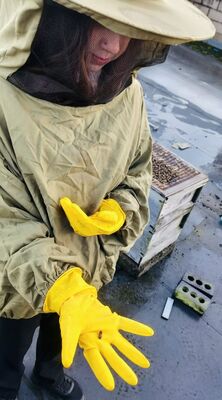FOR Jo Montague and her three kids, it was the perfect break. She just loves outdoor swimming – the colder the water the better. So getting a camper van to stay on the shores of Lough Neagh, just 10 minutes from their home in Stewartstown, Co Tyrone, was like a dream holiday.
“We had three weeks,” she said. “The kids loved it, they even paddle boarded before school every morning. They were in a great mood, we were all in a great mood, having such fun and getting all that exercise in the outdoors.
“Then the bloom started and suddenly the kids were all violently sick with vomiting and diarrhoea at three o’clock in the morning. Imagine that in a camper van – it wasn’t pretty!”
Jo, a swimming teacher, was seeing her beloved lake being destroyed right in front of her eyes. “It’s catastrophic,” she said.
She was determined to do something about it – and that’s why she joined the Love Our Lough campaign. Although 'join' might be an exaggeration – you just need to say a single sentence and you’re a 'member'. “I pledge to cherish, to protect and to celebrate the beautiful Lough Neagh.” Say it out loud now and you too are in the collective.
Dúlra’s in – the pledge works in Irish too: ‘Geallaim le meas a thaispeáint do Loch nEachach álainn, é a chosaint agus a cheiliúradh.” It’s impossible to tell how many people have ‘joined’ – but their online petition has 34,000 signatures and rising.
Love Our Lough’s Brian Quinn stopped drinking water through his taps from it a month ago, although NI Water insist it’s safe. Instead, the retired science teacher and his wife go on weekly trips to other reservoirs around the North – like the long drive to Silent Valley in the Mournes – and fill up five-gallon drums.
Brian, from Washing Bay on the lough shore, says bottled water is often sold out in loughshore places like Cookstown.
Brian mightn’t drink Lough Neagh water, but the rest of us probably do. You can type you postcode into the NI Water website and it will tell you which source your tap water comes from. Dúlra’s is Lough Neagh.
Brian says: “The filtering process takes out solids, not toxins. They say it’s safe to drink, but they also say it’s earthy and musty – it’s not supposed to be. You can taste it and you’re not meant to taste pure, clean water.”
He says the problem runs deep. “The bottom of the lough is an ecosystem of its own, but we are destroying that, killing the beginning of the food chain.
“In years gone by you couldn’t open your mouth without swallowing a Lough Neagh fly. This year they are all gone.”
It’s agreed that this ecological crisis has been caused by pollution, particularly from farm overflows, where slurry and septic tank waste is washed into the lough, killing all it comes into contact with.
Save Our Lough leader Louise Taylor is careful not to blame farmers, however. “Many farmers around here feel like they’ve been vilified and we support them. They love the lough as much as we do.
“The problem is we’ve normalised people abusing the environment. It’s a free for all to extract as much as they want.
“We need a consciousness shift. The problem came to a head this year but the destruction of the lough has been happening for years. Locals are concerned – at one stage they had to ring the Fire Brigade because the lough was emitting a fume and they were worried it was dangerous.”
Louise is well qualified to have expert opinion on the matter. Her PhD thesis was on nature experiences in mental health. She’s an ecotherapist, using nature to help people’s physical and mental health. “The natural world is our greatest healer and we are destroying it,” she said.
The green sludge that covered the lough this summer was terrifying and it made headlines not just here, but across the world. “I had calls from papers in China, in Germany, Le Monde,” Louise said
Louise wants the lough to be given back to those who live around it, to be put into public ownership. “It think it should be a peace park,” she said. “It’s a special place that needs special care.”
• If you’ve seen or photographed anything interesting, or have any nature questions, you can text Dúlra on 07801 414804.






